
December 31
1880 Birth: George Marshall:
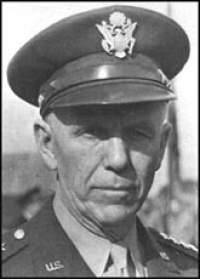
Few Americans in the twentieth century have left a greater legacy to world peace than George C. Marshall (1880-1959). As chief of staff of the United States Army during World War II, it fell to Marshall to raise, train, and equip an army of several million men. It was Marshall who selected the officer corps and it was Marshall who played a leading role in planning military operations on a global scale. In the end, it was Marshall whom British Prime Minister Winston Churchill hailed as "the true organizer of victory." Yet history will associate Marshall foremost as the author of the Marshall Plan. The idea of extending billions of American dollars for European economic recovery was not his alone. He was only one of many Western leaders who realized the tragic consequences of doing nothing for those war-shattered countries in which basic living conditions were deplorable and still deteriorating two years after the end of the fighting. But Marshall, more than anyone else, led the way. In an address at Harvard University on June 5, 1947, Marshall, in his capacity as secretary of state, articulated the general principles of the Marshall Plan. Between 1948 and 1951, the United States contributed more than thirteen billion dollars of economic, agricultural, and technical assistance toward the recovery of free Europe. The Marshall Plan was generally acclaimed a success in its day and has admirably withstood the rigors of historical inquiry. Moreover, it gave impetus to the formation of the North Atlantic Treaty Organization and to the European Common Market. In recognition of Marshall's world leadership, he was awarded the Nobel Peace Prize in 1953.
1908 Birth: Simon Wiesenthal:

At the end of World War II, thousands of Nazis who participated in the systematic murder of some 6,000,000 Jews and millions of Gypsies, Poles and other "inferior" peoples, slipped through the Allied net and escaped to countries around the globe, where many still live in freedom.
Simon Wiesenthal, a survivor of the Nazi death camps, dedicated his life to documenting the crimes of the Holocaust and to hunting down the perpetrators still at large. "When history looks back," Wiesenthal explained, "I want people to know the Nazis weren't able to kill millions of people and get away with it." His work stands as a reminder and a warning for future generations.
1915 World War I: Appalling losses have been suffered during 1915 on both sides: 612,000 Germans, 1,292,000 French, and 279,000 British. The year ends with no appreciable shift in the battle lines scarring the landscape from the North Sea to the Swiss Alps. Russian casualties on the Eastern Front are more than 2 million men, about half POW's. Combined German and Austrian casualties exceed 1 million.
1916 World War I: Romania: The army, with belated Russian support, holds only one tiny foothold in their own country. The remnants of the Romanian armies have been driven north into Russia, and the bulk of Romania's wheat fields and oil wells have fallen into German hands.
1927 Various:

Henry Ford publishes the last issue of the Dearborn Independent:
On December 31, 1927, the Dearborn Independent—a newspaper published by Henry Ford that, at the peak of its popularity in the mid-1920s, had about 700,000 readers—rolls off the printing press for the last time. Since 1920, Ford had used the paper as a platform for his anti-Semitic ideas, and many of its articles and essays were collected and published in a book called "The International Jew: The World's Foremost Problem." It was a bestseller in Nazi Germany and remains in print today.
Henry Ford was an innovative entrepreneur, but he was also a flagrant and unapologetic bigot: He hated immigrants, thought labor unionists were "the worst thing that ever struck the earth" and made no secret of his belief in "the Jewish plan to control the world, not by territorial acquisition, not by military aggression, not by governmental subjugation, but by control of the machinery of commerce and exchange." (He blamed Jewish bankers for everything that was wrong with the world, from the Great War to his own inability to buy out his company's shareholders during the recession of 1919.) Early in 1920, he put a new editor in charge of the Independent after the old one refused to print Ford's vitriolic essays and resigned, and the first of the paper's anti-Semitic tirades appeared in May 1920. They circulated widely, since the paper was sold by subscription as well as through Ford's nationwide network of dealerships.
In 1927, a Jewish lawyer and farm cooperative organizer named Aaron Sapiro sued Ford for defamation. (His was the third anti-Independent lawsuit, but the first to go to trial.) In court, Ford refused to take responsibility for the articles that appeared in his newspaper: in fact, he faked a car accident and hid in the hospital so he wouldn't have to testify. The suit ended in a mistrial, and—likely because of all the bad publicity the trial and the newspaper had brought him—Ford agreed to a private settlement with Sapiro. He issued a somewhat insincere public apology for his newspaper's years of defamatory content—"to my great regret," he wrote, "I have learned that Jews . . . resent this publication as promoting anti-Semitism"—and at the end of the year he closed down the Independent for good. (History.com)
Volkishness: The priory of Staufen at Dietfurt near Sigmaringen is formally consecrated by the Swabian ONT. Rituals are performed in a grotto chapel beneath the old fort, under the priorate of Count Hochberg, until the end of the 1930s. (THP)
1930 Weimar: Germania: the daily newspaper of the Catholic Center Party, features an article saying of the Nazis: "Here we are no longer dealing with political questions but with a religious delusion which has to be fought with all possible vigor."
1931 Weimar: The SS Engagement and Marriage Order is officially announced. Under this regulation, no member of the SS is allowed to marry until both his and his prospective bride's genealogy has been analyzed by a new SS department, directed by Richard Walther Darre. This department will eventually be designated as the Office of Race and Settlement. The order states: "Permission to marry will be granted or refused solely and exclusively on the basis of criteria of race and hereditary health." Himmler himself will spend hours poring over photographs of SS men and their prospective brides with a magnifying glass, searching for 'racial characteristics' indicating 'non-Aryan' progenitors.
1933 Various:
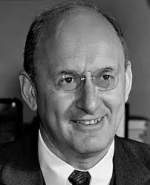
President Roosevelt appoints Henry Morgenthau, Jr. as Secretary of the Treasury:
Morgenthau defended the dollar against devaluation by other competitive nations. This was accomplished by intervening in the world financial markets through buying and selling foreign currencies, gold and dollars. Protecting the dollar against the depredations of Nazi Germany which was using blocked currencies to produce anarchy in the foreign exchange markets, Morgenthau succeeded until after the Munich Pact of 1938, when a stabilization agreement was reached. As a result, the United States dollar became the strongest currencyin the world.
Joseph Goebbels, at the end of the first year of Nazi rule, gives his first annual New Year's Eve speech:
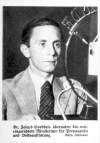
What a difference from the New Year's Eve of a year ago. Then the Reich stood before the abyss. The people were torn by hatred and civil war. The parties and the government lacked the strength even to recognize the catastrophe, much less to deal with it. Collapse and desperation were rising wherever one looked, and the specter of Bolshevism was everywhere. But today? The Reich is once more strong and powerful, the people more united and firm than ever before, led by a strong hand who is dealing with the problems we face. Where once there was hopelessness and despair, today a whole nation is filled with faithful devotion.
1938 Various:
Church & Reich: Despite all the pressures to leave the Church, an internal SS report states that 22.7 % of the SS membership still belongs to the Catholic faith.
Joseph Goebbels's New Year's Eve speech:
There is no doubt that the year 1938 was unique in German history. It fulfilled a thousand-year dream of the German nation. The Greater German Reich has become reality. All other political events pale before this historical fact. Other events may be important, but in comparison they are but of passing interest. The return of over ten million Germans to the Reich is an event of historic significance that goes far beyond the year. It will affect the most distant future.
1939 World War II: Joseph Goebbels' New Year's Eve speech:
From the beginning, it was clear to everyone who can not only read history, but can experience it, that this year would deeply affect the fate of Germany and the European peoples. True, the first two months were relatively uneventful, but he who saw clearly knew it was only the calm before the storm. Everyone felt that it would be a year of important decisions.
1940 World War II: Joseph Goebbels' New Year's Eve speech:
People would have thought me a fool and a dreamer, certainly not a politician to be taken seriously, had I prophesied in my New Year address last year that we would now have a front reaching from Kirkenes to Biskaya, that German soldiers would be standing watch along this 5000 kilometer long front, that Norway would be under German protection up to the Arctic Circle, that France would be militarily destroyed, that England would be suffering under the German counter blockade, that it would be receiving attacks by day and night on its centers as revenge from the German Luftwaffe, that it would be reeling from the blows of our army and struggling for its very existence, and that London would be begging for help from the rest of the world to survive even a few months longer. I would have been asked: "How are you even going to get to Kirkenes? Where are the ships you will need? And France has tough and brave soldiers. Its army is well-equipped and armed. It is rich, it has much support, and do not forget the Maginot Line! We have painful memories of the World War, in which we fought for weeks to gain a half a kilometer of land and soaked the French soil with streams of German blood." I would have heard all that and more. Today such comments are long forgotten. We hardly remember them.
1942 Various:
Church and Reich: During 1942 a number of Catholic officers serving in Russia and Poland have reported to the episcopate about the murder of the Jews. One such officer, Dr. Alfons Hildebrand, took special leave from his unit near Minsk to report the massacres he had witnessed to Cardinal Faulhaber. Dr. Joseph Mueller, an officer in Canaris' Military Intelligence Service and a confidant of Cardinal Faulhaber, also kept the episcopate well informed about the systemic atrocities committed in Poland. Another source of information was Dr. Hans Globke, a Catholic and high official in the Ministry of the Interior entrusted with handling racial matters.
The Secret Diary of Anti-Hitler Conspirator Ulrich von Hassel: (Ebenhausen)
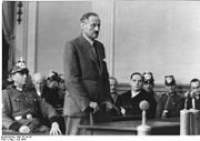
The last day of a year that has unremittingly worsened the German situation more and more. Did ever any man in history assume with such wantonness such a terrible responsibility? Has any people ever yielded with such apathy?
1943 World War II: Various:
Poland: Nazis burn alive 59 Polish villagers in a granary at Karpiowak as reprisal for anti-occupation activities. (THP)
Joseph Goebbels's New Year's Eve speech:
The year 1943 is nearing its end. It will never be forgotten by us who fought and worked and lived through it. It was the most difficult year of the war so far, one that subjected us to great moral and material tests. It gave us the task of holding that which we conquered in our glorious offensives of the earlier war years, which is the foundation of our final victory, and of defending it against the raging storm of our enemies with courage and without wavering. In large part we succeeded. We have had it is true to accept losses and setbacks, but they in no way are decisive for the outcome of the war, nor are their causes to be sought in any failure in our morale or material during this long war. The cowardly betrayal of the Italian king and a clique of generals cost the Axis camp the economic and military strength of an ally, and it could not be avoided that the general war situation was affected thereby. We had to pull back our lines in the East as well as in the South. The resulting withdrawals of our troops gave the enemy side a welcome opportunity to speak of the military collapse of the Reich, or even to make overhasty reports of approaching victory. They were fundamentally mistaken.
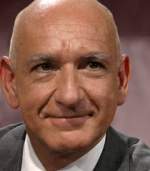
Birth: Krishna Bhanji (better known as Ben Kingsley) in Yorkshire, Northern England. He was educated at the Manchester Grammar School, an independent school, alongside the actor Robert Powell, and your editor (with whom he spent Sunday afternoons for a couple of years, listening to Buddy Holly and early Elvis).
He joined the Royal Shakespeare Company in 1967 and, in 1982 became internationally famous with the lead role in Attenborough's Ghandi. Most relevant to the Group was his performance as Itzchak Stern, Schindler's accountant. He was knighted by Queen Elizabeth II on his birthday in 2001. Quoted as saying: "Every time we got something into the camera it was as if we were saying to the 6 million ghosts—with a wry smile on our faces, and a sense of accomplishment—That's for you!" [On shooting Schindler's List]" And to your editor: "Yes, I have made many lovely films, but Schindler was the best."
1944 World War II: Various
Greece: Archbishop Damaskinos of Athens is sworn in as regent and Papandreou resigns. Soon, fighting will break out between pro-royalist Greek soldiers and communist partisans. He will take control of the situation in his early term, appointing himself Prime Minister during late 1945. Though he will wield little power in his latter term, Damaskinos will continue to call for peace and order in the country. (THP)
Poland: the Communist dominated Committee of National Liberation based in Lublin assumes the title of Provisional Government. The government-in-exile in London protests to no avail.
Hungary declares war on Germany:
On this day, the provisional government of Hungary officially declares war on Germany, bringing an end to Hungary's cooperation—sometimes free, sometimes coerced—with the Axis power.
Miklas Horthy, the anticommunist regent and virtual dictator of Hungary, who had once hoped to keep his country a nonbelligerent in the war, had reluctantly aligned Hungary with Hitler in November 1940. While ideologically not fascist, Hungary had many radical right-wing elements at play in its politics, as well as a history of anti-Semitism. Those radical forces saw many common "ideals" with Nazism and believed the future lay with Germany. So though Horthy little admired Hitler personally, he felt the need to placate influential parties within his own country and protect his nation from Soviet domination.
When the Germans invaded the Soviet Union, Hitler demanded that Hungary mobilize its military against the Soviets as well. So on June 29, 1941, Hungary declared war on the USSR. In March 1942, Horthy replaced Prime Minister Lazlo Bardossy, (a political manipulator too eager to piggyback on German territorial expansion and turn on former allies for the sake of personal gains), with Miklos Kallay, who shared the regent's goal of regaining the favor of the Western—non-Soviet—Allies. Kallay was able to communicate to the Allies that Hungary was open to switching sides again should they make it to Hungary's border and offer Hungary protection from German and/or Soviet occupation.
In January 1943, the Battle of Voronezh against the USSR saw Hungary's entire 2nd Army decimated by the Soviets, rendering Hungary militarily impotent. Hitler, who learned of Kallay's sly communiques with the West, gave Horthy an ultimatum: Either cooperate fully with the German regime or suffer German occupation. Horthy chose to collaborate, which meant the suppression of left-leaning political parties and an intense persecution of Hungary's Jews, including massive deportations to Auschwitz, something Kallay, to his credit, had fought to prevent. (More than 550,000 Hungarian Jews—out of 750,000—would die during the war.)
As Soviet troops began to occupy more Hungarian territory, a desperate Horthy signed an armistice with Moscow. When the regent announced this on radio, he was kidnapped by the Germans and forced to abdicate. Ferenc Szalasi, leader of the fascist Arrow Cross Party, was made head of the country on October 15, 1944, though he was little more than a puppet of the Germans. His rule of terror, especially against Hungary's Jews, would become infamous.
Soviet troops finally liberated the bulk of Hungary from German rule in December 1944. On December 31, a Provisional National Assembly, composed of Communists loyal to the USSR, officially declared war on Germany. The Assembly would go on to sign an armistice with all the Allies in January of 1945. (History.com)
Ardennes: The British XXX Corps captures Rochefort at the western end of the salient.
Churchill to FDR:
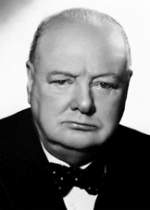
The Greek King behaved like a gentleman and with utmost dignity, and I am sure a private message from you would give him comfort. I shall send only a civil acknowledgment to ELAS for the published message they have sent me, and hand the matter over to the Archbishop. It is clearly his job now. The great battle in the West seems to be turning steadily in our favor, and I remain of the opinion that Rundstedt's sortie is more likely to shorten than to lengthen the war.
Churchill to Eden:
You may feel inclined to see how the proposals which have come on the tapis meanwhile for a bilateral treaty between Britain and France shape themselves. You said to me that if de Gaulle attempted to say that there could be no Anglo-French Treaty until we had settled everything about Syria you would let him wait. It is for him to make the proposal, not us. Meantime, we are losing nothing from the point of view of security, because the French have practically no army and all the other nations concerned are prostate or still enslaved. We must be careful not to involve ourselves in liabilities which we cannot discharge and in engagements with others for which there is no corresponding return. I do not know what our financial situation will be after the war, but I am sure we shall not be able to maintain armed forced sufficient to protect all these helpless nations even if they make some show of recreating their armies. Anyhow, the first thing to do is to set up the World Organization, on which all depends.

1946 US President Truman formally declares an end to all hostilities in the Second World War.
1951 The Marshall Plan expires after distributing more than $12 billion in foreign aid.
1957 Death: Douglas M. Kelly: the American psychiatrist who examined the Nuremberg defendants. On New Year's Eve he went up to the attic of his house while his family was downstairs. He suddenly appeared on the staircase and announced that he had just swallowed the cyanide capsule found on Hermann Goering. Then he collapsed dead.
1961 Kennedy and Khrushchev exchange holiday greetings:
On this day in 1961, President John F. Kennedy issued a statement extending his "sincere wishes" and those of the American people to Soviet Premier Nikita Khrushchev and the people of the Soviet Union for a peaceful and prosperous New Year. It was the height of the Cold War and the United States and Soviet Union were locked in a nuclear arms race. [For further information, click here]
1971 Kurt Waldheim takes over as UN secretary-general after U Thant retires.
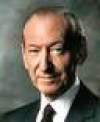
It was not until Waldheim left the United Nations and then ran for president of Austria in 1986 that his wartime past became widely known. During his presidential campaign, the efforts of his political opponents, investigative journalists, historians and the World Jewish Congress uncovered archival evidence of Waldheim's involvement with the Nazi movement as a student and his wartime role in the Balkans.
1978 United States ends official relations with Nationalist China:
Flags at both the American embassy in Taipei and the Taiwanese embassy in the United States are lowered for the last time as U.S. relations with Taiwan officially come to an end. On January 1, 1979 the United States officially recognized the government of the People's Republic of China in Beijing.
1999 Panama Canal turned over to Panama:
On this day in 1999, the United States, in accordance with the Torrijos-Carter Treaties, officially hands over control of the Panama Canal, putting the strategic waterway into Panamanian hands for the first time. Crowds of Panamanians celebrated the transfer of the 50-mile canal, which links the Atlantic and Pacific oceans and officially opened when the SS Arcon sailed through on August 15, 1914. Since then, over 922,000 ships have used the canal. [For further information, click here]
Edited by Levi Bookin (Copy editor)
levi.bookin@gmail.com
FAIR USE NOTICE: This site may contain copyrighted material the use of which has not always been specifically authorized by the copyright owner. We are making such material available in our efforts to advance understanding of historical, political, human rights, economic, democracy, scientific, environmental, and social justice issues, etc. We believe this constitutes a 'fair use' of any such copyrighted material as provided for in section 107 of the US Copyright Law. In accordance with Title 17 U.S.C. Section 107, the material on this site is distributed without profit to those who have expressed a prior interest in receiving the included information for research and educational purposes. If you wish to use copyrighted material from this site for purposes of your own that go beyond 'fair use', you must obtain permission from the copyright owner.
Please note that the list-owner and the moderators are not responsible for, and do not necessarily approve of, the random ads placed on our pages by our web server. They are, unfortunately, the price one pays for a 'free' website.